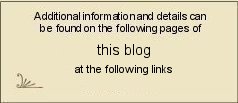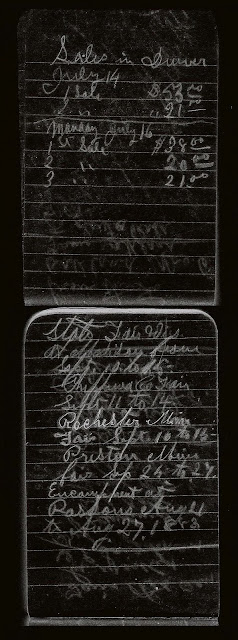Operating the prize package soap sell racket in 1884.
This is page 20, the continuation of page 19, and dated May 6 - May 29, 1884, as well as the continuation of pages 18-19, the beginning of Soapy Smith's criminal empire building in Denver, Colorado.
It is the continuation of deciphering Soapy Smith's "star" notebook from the Geri Murphy's collection. A complete introduction to this notebook can be seen on page 1.
These notebook pages have never been published before! They continue to be of revealing interest. The picture that the pages draw is of young 22 year-old Jefferson pursuing "soap sales" over a very wide spread of territory and in a very tenacious, even driven, way.
The notebook(s) are in Soapy's handwriting, and sometimes pretty hard to decipher. A large part of this series of posts is to transcribe the pages, one-at-a-time, and receive help from readers on identifying words I am having trouble with, as well as correcting any of my deciphered words. My long time friend, and publisher, Art Petersen, has been a great help in deciphering and adding additional information.
I will include the original copy, an enhanced copy, and a negative copy of each page. Also included will be a copy with typed out text, as tools to aid in deciphering the notes.
There are a total of 24 pages. This means that there may be upwards of 24 individuals posts for this one notebook. Links to the past and future pages (pages 1, 2, 3, etc.) will be added at the bottom of each post for ease of research. When completed there will be a sourced partial record of Soapy's activities and whereabouts for 1882-1884.
The notebook(s) are in Soapy's handwriting, and sometimes pretty hard to decipher. A large part of this series of posts is to transcribe the pages, one-at-a-time, and receive help from readers on identifying words I am having trouble with, as well as correcting any of my deciphered words. My long time friend, and publisher, Art Petersen, has been a great help in deciphering and adding additional information.
I will include the original copy, an enhanced copy, and a negative copy of each page. Also included will be a copy with typed out text, as tools to aid in deciphering the notes.
There are a total of 24 pages. This means that there may be upwards of 24 individuals posts for this one notebook. Links to the past and future pages (pages 1, 2, 3, etc.) will be added at the bottom of each post for ease of research. When completed there will be a sourced partial record of Soapy's activities and whereabouts for 1882-1884.
Important to note that the pages of the notebook do not appear to be in chronological order, with Soapy making additional notes on a town and topic several pages later.
Pages 18-20 are very important as they are descriptions of Soapy's early beginnings of his criminal empire in Denver. From my research I know that Charles L. "Doc" Baggs and "Big Ed" Chase are the two main bunko bosses in Denver, and Soapy is not yet fully entrenched in the Denver underworld at this time. Although the communication of twenty-one-year-old Soapy Smith is with himself, the writing also communicates with us about him 142 years later (and potentially far beyond today).
The bulk of page 20 is a list of sales (soap) in Denver, along with a few plans for future work trips.
Below are my attempts to attempts to make the writing easier to see and decipher.
 |
| Soapy Smith STAR Notebook Page 20 - Enhanced copy 1884 Courtesy of Geri Murphy |
(Click image to enlarge)
 |
| Soapy Smith STAR Notebook Page 20 - Negative copy 1884 Courtesy of Geri Murphy |
(Click image to enlarge)
 |
| Soapy Smith STAR Notebook Page 20 - Deciphered copy 1884 Courtesy of Geri Murphy |
(Click image to enlarge)
Page 20
- Line 1: "May 6th two sales $71.00" [1884]
- Line 2: "May 7th two sales $75.00"
- Line 3: "May 8th 000 00.00"
- Line 4: " ' ' [May] 9 000" [scratched out]
- Line 5: "May 10 two sales [$]43.00"
- Line 6: "May 11 Sunday 0000"
- Line 7: "May 12 two sales [$]2800"
- Line 8: " ' ' [May] 13 00 0000"
- Line 9: "May 14 one sale [$]2600"
- Line 10: "May 15 one sale [$]2000"
- Line 11: "May 16th 000 0000"
- Line 12: "May 18 two sales $7600"
- Line 13: "May 19 one sale [$]7400"
- Line 14: "Race Trinidad [Colorado] June 2d [2nd]"
- Line 15: "C. Gus Jones."
- Line 16: "Ft. Worth"
- Line 17: "Tex" [Texas]
- Line 18: "C. Gus Jones"
- Line 19: "Racs [races] 27. 28 and 29 May"
- Line 20: "at Cheyenne" [Wyoming]
One hundred and forty-one years ago, Soapy Smith was enjoying considerable "sales" success on Denver street corners with the prize package soap sell racket. On Tuesday May 6, for two sales, he made $71, the equivalent of making $2,523.54 in 2025 dollars. On Monday, May 19, in just one sale he obtained $74 (equivalent to $2,630.17). Over the 14 days he operated, May 6 – 19, he worked 8 days and took in $413 (equivalent to $14,679.20), about $51.63 ($1,835.08) per work day, which was an enormous amount in 1884. Even better is taking into consideration that each sale probably didn't last longer than 30 minutes, thus in the 8 days he performed a total of 13 sales for a total of 6.5 hours, meaning that Soapy was making about $63.54 per hour! That's good money today, but that $63.54 is equivalent of $2,258.39 per hour in 2025 dollars! Guess he could afford to take the 5 days off that he did (lines 3, 4, 6, 8 and 11).
Note that his days off are not really consecutive (May 8, 9, 11, 13 and 16). Perhaps he also took days off because he felt he should, or had to. Several possible reasons come to mind, such as to allow sore losers time to move on, to allow the market to refresh with new customers, and to reduce exposure that could attract the constabulary, or even a policeman's threat of arrest, or the complaint by one of his victims.

One must wonder who Jones from lines 15 and 18 might be. A supplier of goods in Fort Worth? A friend? A Ft Worth confidence man Soapy knows, or perhaps a victim seeking the return of his losses? I looked for a "C. Gus Jones" in Texas during this period and found one Gus Jones, a Black machinist and family man.
 |
| Union Pacific Railroad map 1883 Courtesy of Library of Congress |
Click image to enlarge
The final comments are in regards to the races in Cheyenne, Wyoming on May 27-29, 1884. A Cheyenne newspaper tells of races in May but of their not being well attended because of the weather. The same paper reported ongoing lightning, heavy rain, and flooding.
Going to Cheyenne from Denver was about a one-day journey on the Union Pacific Railroad. The 1883 Union Pacific map above shows an established route that ran about 110 miles north to Cheyenne, less than half the distance to Trinidad. The distance makes Cheyenne as likely a place to take in races as Trinidad. If Soapy went to Cheyenne for those three days of races as he apparently considered doing, he was likely disappointed by the weather.

Notebook pages
April 24, 2017
Part #1
Part #2
Part #3
Part #4
Part #5
Part #6
Part #7
Part #8
Part #9
Part #10
Part #11
Part #12
Part #13
Part #14
Part #15
Part #16
April 24, 2017
Part #1
Part #2
Part #3
Part #4
Part #5
Part #6
Part #7
Part #8
Part #9
Part #10
Part #11
Part #12
Part #13
Part #14
Part #15
Part #16
Part #24 (not published yet)
"Neither gunman nor ruffian, but always a lawless marauder, he was the Robin Hood of the frontier. Continually at odds with the law, which pursued him in endless exasperation, he was, frequently, the law’s best friend."
—The Reign of Soapy Smith, 1935























.jpg)






